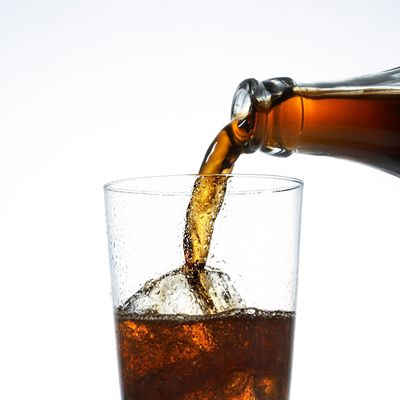
It’s been a tough decade for soda companies who, like fast-food chains, have been the target of repeated campaigns that remind people the stuff makes you fat. Consumers, it turns out, are listening to people like Mayor Bloomberg, despite his failed attempt to ban large-format sugary beverages. As Ad Age reports, soda consumption is at a twenty-year low in the U.S., with total consumption down to 1996 levels and per capita soda drinking down to 1987 levels. That’s good news for the obesity crisis and bad news for corporate bottom lines, but it’s clear that companies like Coca-Cola are working hard to get ahead of this image problem they’re having.
After rising steadily through the nineties, soda consumption has shown declines each year since 2005, the year after Super Size Me came out. And thus we’re seeing the major beverage brands both expanding their low- and no-calorie product lines, and addressing the obesity issue head-on, as Coke has with their new health-focused ad campaigns. It’s the first time that a major soda brand has appealed directly to their consumer base with a double dose of nostalgia for old-timey Coca-Cola kitsch and feel-good messaging about recycling, diversity, and calorie counting. And, they’re admitting, at least in a small way, that Coke makes people fat.
It’s akin to McDonald’s getting greener and “healthier,” and American Spirit cigarettes touting how organic and ecofriendly they are, but obviously Coke Zero is not as bad for you as smoking. And in the 2010s, health- and earth-consciousness sells.
Coke still dominates with a 17 percent market share, with Diet Coke in the No. 2 spot at 9.4 percent and Pepsi a distant third at 8.9 percent. Coca-Cola was also smart to snap up the extremely popular, hangover-helping Vitaminwater brand, which now comes in a zero-calorie version, even if they are being sued right now over the representation of the full-sugar version as being somehow healthy.
In any event, no one in the beverage realm is hurting too badly, and it remains a $77 billion industry, which includes retooled and caffeinated energy drinks like Mountain Dew’s new morning beverage, Kickstart. And you can expect the coming years to bring us more from this new generation of soft drinks, targeted at anyone who’s stopped purchasing the older generation, from hip kids with hangovers to sugar-phobic moms.
Soda Consumption Down to Levels Last Seen 1996 [AdAge]
Related: Coca-Cola Admits That It Makes Americans Fat in New Ad
Mountain Dew Introduces Kickstart, a Morning Soda
Calorie Counts Coming to Soda Vending Machines




